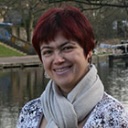
Mirela Barbu is a Senior Lecturer in Supply Chain Management, who joined the Business School in 2019 following the completion of her PhD in Economic Geography at the University of Sussex in 2013. Transitioning from teaching geography to engaging with a diverse and international student cohort in a business school has been a stimulating and enriching experience. This new environment has provided Mirela with the opportunity to innovate her teaching methods, fostering collaboration and promoting cultural exchange among her students. One of the most rewarding aspects of her role has been the unexpected challenge of teaching management consulting, leveraging her decade-long experience as a consultant at the institutional level.
What I Did
This unique and innovative teaching approach leverages collaboration with areas of our university which are not usually involved in education. Instead of the usual research-heavy approach, I developed a consultancy assessment for the module Business Analysis and Consulting, a masters level module in the Business School which provides students with hands-on experience in management consulting. Over the years, I’ve collaborated closely with the university’s Estates and Facilities Division, particularly with Helen Power-Hosking, to create a real-world consulting environment for students.
Why I Did It
The idea behind this assessment came about somewhat serendipitously when Helen Power-Hosking, Head of Commercial Services, knocked on my office door by mistake. This chance encounter led to a conversation about my work, and soon after, the consultancy report was born. The primary motivation was to offer students a practical, hands-on learning experience that would prepare them for the real challenges of management consulting. I wanted to create an environment where students could apply their academic knowledge to solve real problems, thereby enhancing their employability and soft skills, which are often not fully developed in a traditional classroom setting.
How It Works
The consultancy report is a group-based assessment where students work with a real client, in this case the Estates and Facilities Division. Each year, the client provides a brief on a particular issue, such as improving campus services or understanding student energy consumption patterns. Students are divided into teams and tasked with collecting data, analysing it, and presenting their findings to the client. The process is designed to mirror a real consulting environment, complete with client interactions, data collection, and final presentations to senior management. The top-performing teams even get the opportunity to present their work to the division’s management as a reward.
Impact and Student Feedback
The impact of this assessment has been profound, both for the students and for the university. Students often describe it as the most challenging yet rewarding experience of their academic careers. They appreciate the real-world application of their skills and the opportunity to work on something that feels genuinely important. The assessment pushes them to develop critical skills like teamwork, communication, and time management. For the Estates and Facilities Division the report provides valuable insights and data that they wouldn’t otherwise be able to gather, making it a mutually beneficial endeavour.
Future Developments
Looking ahead, I plan to continue refining and developing this module. Each year brings new challenges and opportunities and I’m always looking for ways to improve my students’ experience. The assessment’s success relies heavily on the enthusiasm and cooperation of our client, particularly Helen Power-Hosking. As long as we can maintain these strong relationships, I believe the consultancy report will continue to thrive. We are already discussing potential briefs for the next academic year and I’m excited to see where this journey takes us.
Top Tips
- Embrace challenges
When faced with a new or unfamiliar task, like redesigning a module, consider it an opportunity to innovate. This mindset can lead to unexpected and rewarding outcomes.
- Build strong partnerships
The success of this assessment hinges on strong, collaborative relationships, engaging with an enthusiastic stakeholder, and seeing the mutual benefits of working with students.
- Focus on real-world application
Designing a project that mirrors real-world scenarios can significantly enhance students’ learning experiences and better prepare them for their future careers.
- Be flexible and supportive
Allow students some degree of freedom in how they approach the assessment. This flexibility helps them feel more invested and encourages them to take ownership of their work.
- Prepare students gradually
Building the necessary skills for such a demanding assessment should start early. Integrate skill-building exercises into your module from the outset to ensure students are ready when the time comes.


[…] Authentic assessment through collaboration: teaching management consulting in partnership with our u… […]